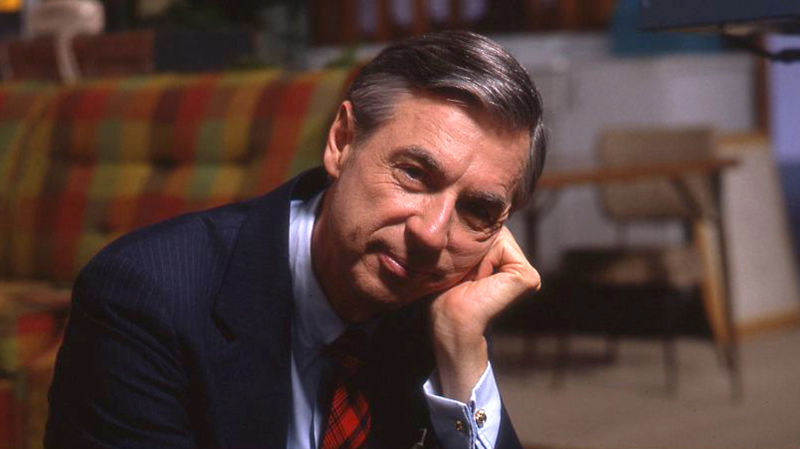JULY 9, 2018
I never really knew a whole lot about Fred Rogers.
Of course, I had heard of him and saw most of the parodies (particularly Eddie Murphy’s on “SNL”). But his PBS series “Mister Rogers’ Neighborhood” was aimed at the generation after mine. I was more of a “Captain Kangaroo” kid, but, as much as I loved Mr. Moose and Mr. Green Jeans on the Captain’s show, I now wish I had a Mr. Rogers to guide me through my childhood.
Superb filmmaker Morgan Neville, who has made two terrific documentaries — 2013’s “20 Feet From Stardom” (which won him an Oscar) and 2015’s “Best of Enemies,” which covered the televised bitchfest between Gore Vidal and William F. Buckley Jr. during the 1960 Presidential conventions.
Now he’s pulled a hat trick with his third wonderful doc, “Won’t You Be My Neighbor?” Thankfully, much of Fred Rogers’ later life has been captured on film and tape. But it’s his early life that was an eye-opener to me. Bullied in school because of his weight — he was known as “Fat Freddy” — Rogers was determined to live a life of kindness, enrolling in the seminary and becoming an ordained Protestant minister. (I would imagine he would have been a very different kind of minister than Ethan Hawke’s clergyman in “First Reformed,” which I reviewed last week.)
Rogers had a brush with television earlier in his life, and, after being appalled by the state of children’s shows at that time, decided to make television his ministry, and he managed to land one at local Pittsburgh station WQED in 1968.
“If you took all the elements that make good television and do the exact opposite, you’d have ‘Mister Rogers’ Neighborhood,'” notes the series’ producer, Margy Whitmer. And she’s right. The show, even when it became national via PBS, may have had shoddy production values, but its target audience didn’t care because it had Fred Rogers.
“Mister Rogers’ Neighborhood” was different in other ways, as well. The show had been only on a few days when one character, a hand puppet named King Friday XIII, an aspiring despot, decided that he didn’t want to be around certain kinds of people, so he order a huge wall to be built to keep them out. This was in 1968, and the show hadn’t even been on a week!
Rogers always felt that kids had feelings as complex as adults, so he never seemed to shy away from difficult themes that affected children, too, such as episodes devoted to death and divorce. When Robert F. Kennedy was assassinated during the first few months of the show, Mr. Rogers did not avoid the topic, having his alter ego on the show, a hand puppet named Daniel Striped Tiger, ask in a confused voice, “What does assassination mean?”, and Mr. Rogers dealt with it because he knew that children were hearing the word from their concerned parents.
Reality intruded into the show in other ways, as well. When African-American children in public pools were harassed by racists who poured cleaning liquid into the water in which they were swimming, Mr. Rogers made a point of creating a scene where the show’s African-American policeman, Officer Clemmons (François Clemmons), was asked by Mr. Rogers to join him in dipping his feet in a wading pool together.
But there were some boundaries that, at the time, Mr. Rogers couldn’t cross. When Clemmons was spotted at a gay bar in downtown New York, Mr. Rogers told him that he couldn’t be public about his homosexuality. (This was the late 1960s and early 1970s, remember, and the idea that a gay performer on a show for children could be out was unthinkable at that time.) Still, as Clemmons tearfully recalls, Rogers told him that he loved him, and he notes that this was the first time a man ever said that to him. (That’s the point in the film that I first lost it.)
The film doesn’t dwell too much into Rogers’ private life. Yes, there is a Mrs. Rogers, and every time she appears on camera, she’s delightful. And it doesn’t shy away from the persistent rumor that Mr. Rogers was gay. As Clemmons says, if Fred was gay, Clemmons would be the one to know it.
As much as “Won’t You Be My Neighbor?” is about Fred Rogers, it is also about the power of kindness. In an era where kindness is seen by the powers that be as some proof of weakness, what’s so refreshing about “Won’t You Be My Neighbor?” is that the film demonstrates how much strength kindness displays in changing generations (and therefore the world) for good. And that’s the most powerful ministry for which anyone can ask.
GRADE: B+












